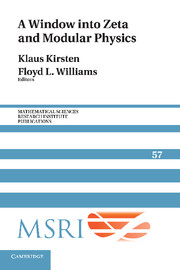Book contents
- Frontmatter
- Contents
- Introduction
- Lectures on zeta functions, L-functions and modular forms with some physical applications
- Basic zeta functions and some applications in physics
- Zeta functions and chaos
- Vertex operators and modular forms
- Applications of elliptic and theta functions to Friedmann–Robertson–Lemaître–Walker cosmology with cosmological constant
- Integrable systems and 2D gravitation: How a soliton illuminates a black hole
- Functional determinants in higher dimensions using contour integrals
- The role of the Patterson–Selberg zeta function of a hyperbolic cylinder in three-dimensional gravity with a negative cosmological constant
Introduction
Published online by Cambridge University Press: 29 May 2025
- Frontmatter
- Contents
- Introduction
- Lectures on zeta functions, L-functions and modular forms with some physical applications
- Basic zeta functions and some applications in physics
- Zeta functions and chaos
- Vertex operators and modular forms
- Applications of elliptic and theta functions to Friedmann–Robertson–Lemaître–Walker cosmology with cosmological constant
- Integrable systems and 2D gravitation: How a soliton illuminates a black hole
- Functional determinants in higher dimensions using contour integrals
- The role of the Patterson–Selberg zeta function of a hyperbolic cylinder in three-dimensional gravity with a negative cosmological constant
Summary
Some exciting, bold new cooperative explorations of various interconnections between traditional domains of “pure” mathematics and exotic new developments in theoretical physics have continued to emerge in recent years. The beautiful interlacing of theory and application, and cross-discipline interaction has led, as is usual, to notable, fruitful, and bonus outcomes.
These interconnections range from topology, algebraic geometry, modular forms, Eisenstein series, zeta functions, vertex operators, and knot theory to gauge theory, strings and branes, quantum fields, cosmology, general relativity, and Bose–Einstein condensation. They are broad enough in scope to present the average reader with not only a measure of enchantment but with some mild bewilderment as well. A new journal, Communications in Number Theory and Physics, has recently been launched to follow and facilitate interactions and dynamics between these two disciplines, for example. Various books that are now available, in addition to an array of conference and workshop activity, accent this fortunate merger of mathematics and physical theory and assist greatly in bridging the divide, although in some cases the themes are pitched at a level more suitable for advanced readers and researchers.
In an attempt to further bridge the divide, at least in some modest way for students and non-experts, and to provide a window into this adventurous arena of intertwining ideas, a graduate workshop entitled “A Window into Zeta and Modular Physics” was presented at MSRI during the period from 16 to 27 June 2008. The workshop consisted of daily expository lectures, speakers’ seminar lectures (where the material was more technical and represented their research, but which at the same time did connect to and enlarge on the daily lectures), and four special student lectures. Given the excellent preparation and presentation of the lectures, it was proposed that it would be of further benefit to the students (especially given their enthusiastic response), and to the mathematical physics community in general, if the lectures were eventually molded in some form as a book. Thus the present volume, with the workshop title and similar style, evolved. Besides the editors, there were three workshop speakers: Geoffrey Mason, Audrey Terras, and Michael Tuite.
Information
- Type
- Chapter
- Information
- A Window into Zeta and Modular Physics , pp. 1 - 6Publisher: Cambridge University PressPrint publication year: 2010
